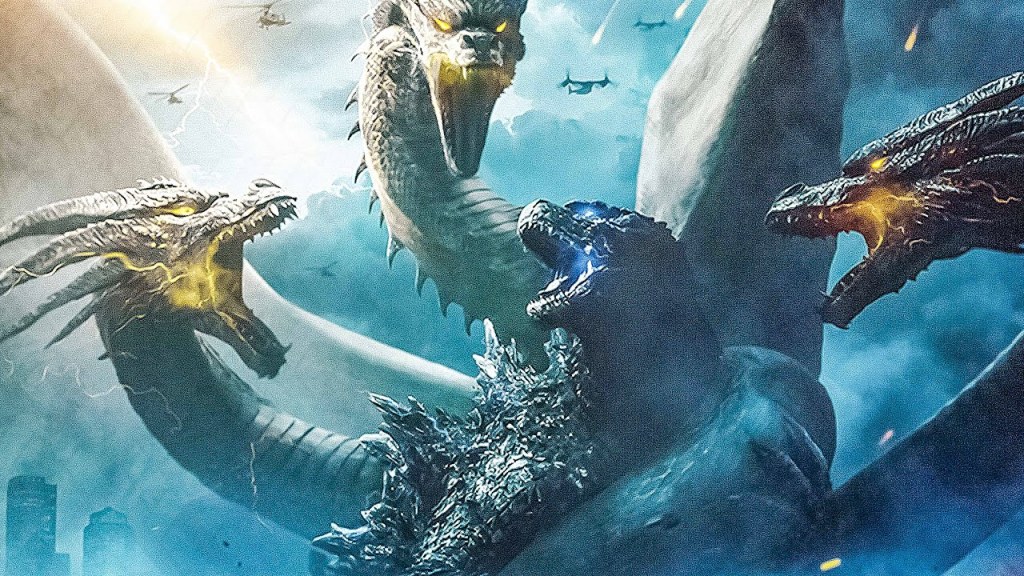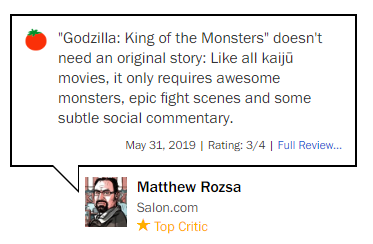In a recent article in Forbes, titled The Critics Are Wrong About Godzilla: King Of The Monsters, Senior Contributor Paul Tassi repackages the faux-populism of YouTube gutter pundits and fandom dramamongers for Middle America.
There’s a very large large gap between the boldness of what Tassi says his article is about (a thorough debunking of all critical opinion of Godzilla: King of the Monsters) and what his article actually delivers (a list of cliché, anti-intellectual talking points that dismiss the need to engage with, or even read, any reviews one already thinks they disagree with). As is typical of this type of faux-populist commentary, Tassi avoids mentioning any specific details about the critical reaction to the film whenever possible. Instead, he pouts and makes vague, wounded declarations like, “I guess I’m not understanding what everyone wanted from this film,” as if his displeasure with opinions he disagrees with is the only rebuttal needed to void them entirely. Instead of addressing any of the points made by negative reviews, Tassi strategically deploys nostalgic recollections of his childhood love of movie monsters and pairs them with descriptions of which plot beats from Godzilla: King of the Monsters reminded him the most of that obsession; all of which are perfectly good reason to watch and enjoy a Godzilla movie but they hardly prove Tassi’s actual argument that having a fondness for movie monsters means all critics are now obligated to agree with him and are bullying him if they don’t. He also leaves space to express pro forma scandalized bewilderment over the movie’s lower-than-100% Rotten Tomatoes score, as happens whenever a franchise movie isn’t received with literally universal acclaim. Tassi concludes, “I usually find myself on the same side of the majority, but as a Godzilla superfan, I have to say that this is everything I could have wanted from a movie like this.”
The implication Tassi want readers to take from all this, of course, is that anyone who disagrees with his assessment of the movie is not a Godzilla superfan; therefore, critics whose opinions deviate from those of “the fans” have stepped out of line by expressing them. In order to dismiss the critics outright, Tassi defaults to the only argument the anti-criticism partisans of fandom have against considered or informed opinions, and invokes the central belief sustaining fandom’s raging hateboner towards critics: whenever “the critics” do not have the same opinions as “the fans,” fandom as a whole is being attacked.

Nowhere in his article does Tassi try to find an answer to the article’s putative subject, “Why don’t critics like Godzilla: King of the Monsters?” He doesn’t even seem to have read any of the reviews he pretends not to understand (what more proof do we need that when Tassi speaks, we hear fandom’s words?). In order for his arguments to make even basic sense, Tassi has to create an imaginary world where film reviewers represent “the majority” and “the fans” are an oppressed, marginalized group; a viewpoint that echoes the arguments of reactionary, anti-intellectual Info Wars dweebs whose greatest fear is an anti-nerd death squad breaking down their door and taking their Funko Pops away.
In the proud tradition of fandom panderers, Tassi purposefully refuses to notice how many of the critics with the biggest audiences have the same tastes as him and frequently agree with him on the basics of what makes a good movie. Despite Tassi’s insistence that “the critics” as a whole have formed an anti-kaiju task force whose sole mission is to make “the fans” feel bad, many of the critics Tassi dismisses agree with him about Godzilla: King of the Monsters. Matt Zoller Seitz at RogerEbert.com and Matthew Rozsa of Salon.com both gave King of the Monsters a score of 3/4 and describe the movie in extremely positive terms. “Its imperfections are compensated by magnificence,” writes Zoller Seitz, while Rozsa’s praise of the movie comes from an almost identical, fandom-based perspective as Tassi’s, writing, “‘Godzilla: King of the Monsters’ doesn’t need an original story: Like all kaijū movies, it only requires awesome monsters, epic fight scenes and some subtle social commentary.” Over at The Escapist, Bob Chipman was so excited by Godzilla: King of the Monsters he took time out of his busy schedule of tweeting about how culling the poor isn’t technically eugenics long enough to bang some action figures together in front of a camera. If that’s not a voice that speaks for the people in the comments section, can such a voice even exist?


We can similarly disprove the nerd bromide that “the critics” are a collective hive mind trying to suppress free thinking by pointing out a 40% Rotten Tomatoes score is a sign of significant disagreement between critics about whether or not to recommend the movie; look no further than the 50/50 split between positive and negative reviews from the six “Top Critics” who lead the review portion of the movie’s Rotten Tomatoes page. But why bother? That a critic, any critic, is allowed to express opinions in conflict with fandom orthodoxy is all the proof needed for Tassi, and “the fans” like him, to declare the entire field of criticism corrupt, oppressive, and outdated whenever it suits them.
Tassi is hardly the first petty demagogue to make a “brave” stand in the name of “the fans” against the sinister, monolithic entity of “the critics”; the only notable thing about “The Critics Are Wrong About Godzilla: King of the Monsters” is how boilerplate the talking points are and how the author’s obvious refusal to engage with the supposed subject of his article makes the flawed foundations of his arguments transparent. The hoary fandom shibboleth Tassi uses to attack critics and portray an internationally-distributed blockbuster as the helpless victims of a conspiracy by all-powerful, anti-fandom critics goes like this: Critics don’t like the same things as me, so it’s rude for them to talk about the things I like when they might say something I disagree with. To which the only acceptable response (aside from, “walk it off, buttercup”) is: If a critic doesn’t like the same things as you and you’re unhappy with their reviews, why does what that critic thinks matter to you? Fandom has become obsessed with the act of media criticism and yet continues to thoroughly and purposefully misunderstand criticism’s purpose, goals, and even the motivations and intentions of the people who create criticism. Even the basic, consumer-friendly criticism of film reviews written after one viewing is too intellectual and outré for the panicky, reactionary mindset of fandom to comprehend, unless the people whom create that criticism demonstrate constant, fearful deference towards “the fans.”
5 thoughts on “Godzilla at the End of History”